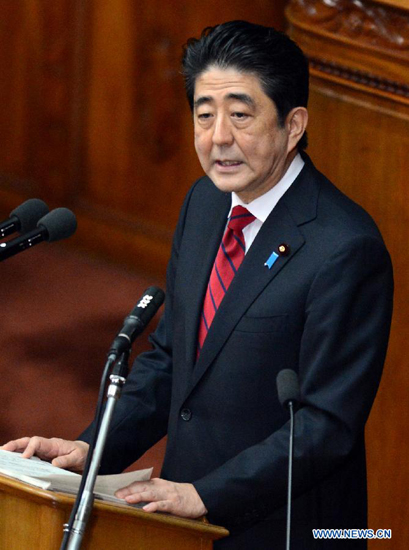Abe eyes collective self-defense
 0 Comment(s)
0 Comment(s) Print
Print E-mail Xinhua, January 24, 2014
E-mail Xinhua, January 24, 2014
Japan's Diet, or parliament, kicked off its annual 150-day session on Friday, with Prime Minister Shinzo Abe eyeing to lift the country's self-imposed ban on collective defense.
|
|
|
Japanese Prime Minister Abe Shinzo delivers a policy speech during the ordinary Diet session of this year at National Diet in Tokyo, Jan. 24, 2014. [Photo/Xinhua] |
Abe said in his policy speech during the opening of the Diet session that Japan will consider what to do about the right of collective defense and collective security, marking the first time the hawkish leader raises the issue in his Diet speech.
Abe also vowed that his country will "play a more proactive role for global peace and stability" with its key ally the United States, despite its frayed relations with neighboring China and South Korea over territorial and historical issues.
However, a controversial visit to the notorious Yasukuni Shrine in late December by Abe has disappointed the United States and triggered fierce opposition worldwide, especially from China and South Korea.
Prior to the thorny issues, Abe said his priority is to revitalize the country's sluggish economy by beating prolonged deflation here, adding that fiscal recovery should also be achieve as the government will raise the sales tax in April to 8 percent from the current 5 percent.
The government also plans to submit a series of bills in a move to accelerate the implementation of Abe's economic growth strategy, according to local reports.
The prime minister said the government will take the leadership in the cleanup of the radioactive contamination and decommissioning at the Fukushima Daiichi nuclear power plant, and to reduce the country's "dependence" on nuclear power "as much as possible."
As to the U.S.-led Trans-Pacific Partnership free trade talks, Abe said Japan will continue to be involved in the negotiations to make "the best decision" that can protect national interests.







Go to Forum >>0 Comment(s)